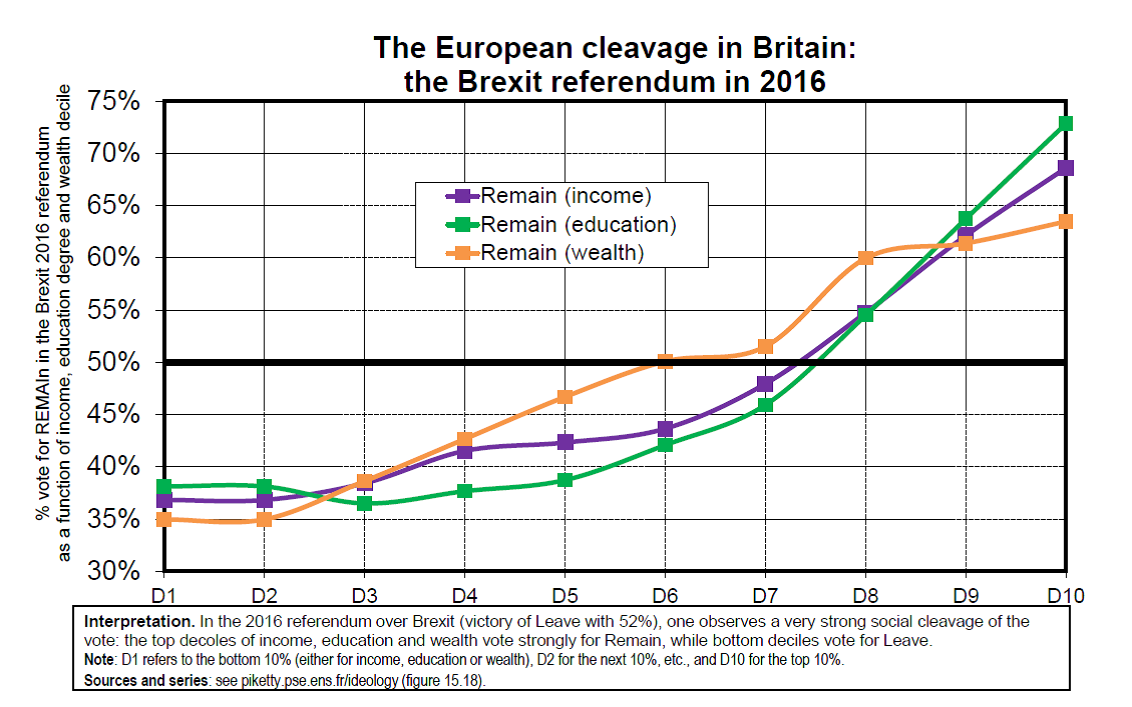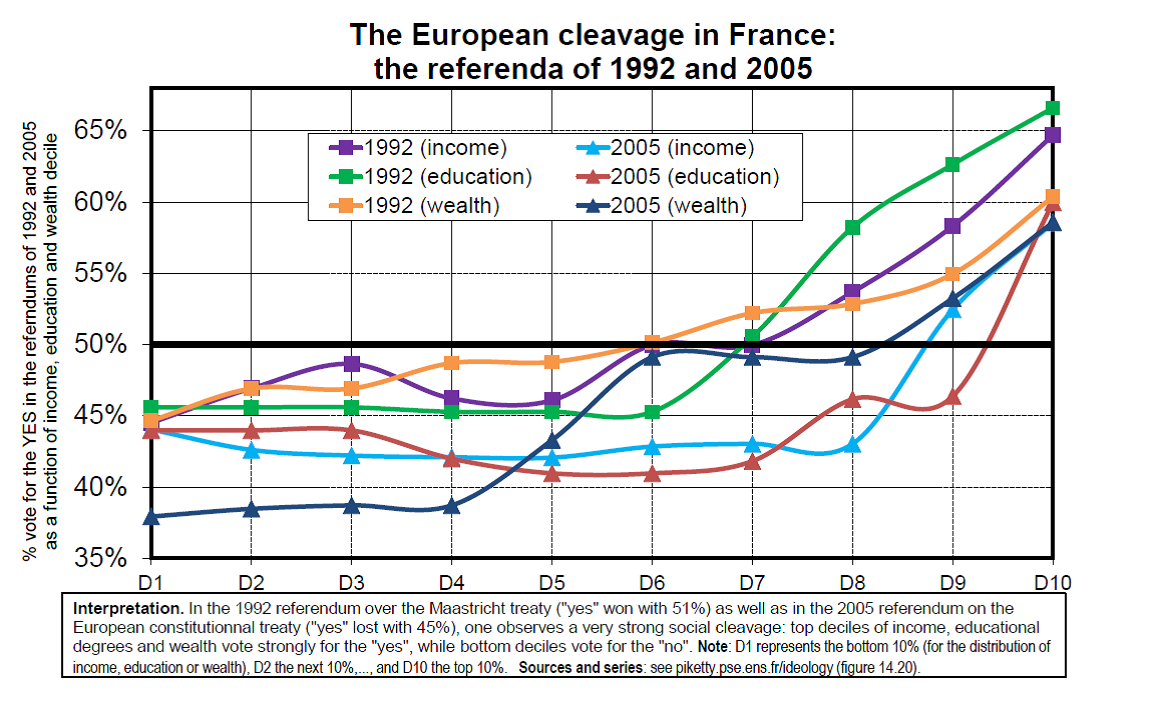The United Kingdom officially left the European Union a few days ago. So now, make no mistake; along with the election of Trump in the United States in 2016 this is a major upheaval in the history of globalisation. The two countries which had the choice of ultra-liberalism with Reagan and Thatcher in the 1980s and which, since then, have witnessed the highest rise in inequalities, have decided three decades later to opt for nationalism and a form of return to frontiers and national identity. This change in direction can be viewed from different angles. In its way, it expresses the failure of Reaganism and Thatcherism. The British and American middle and working classes have not experienced the affluence promised by absolute liberalism, laissez-faire policies and economic deregulation.
Topics:
Thomas Piketty considers the following as important: in-english, Non classé
This could be interesting, too:
Thomas Piketty writes Regaining confidence in Europe
Thomas Piketty writes Trump, national-capitalism at bay
Thomas Piketty writes Democracy vs oligarchy, the fight of the century
Thomas Piketty writes For a new left-right cleavage

The United Kingdom officially left the European Union a few days ago. So now, make no mistake; along with the election of Trump in the United States in 2016 this is a major upheaval in the history of globalisation. The two countries which had the choice of ultra-liberalism with Reagan and Thatcher in the 1980s and which, since then, have witnessed the highest rise in inequalities, have decided three decades later to opt for nationalism and a form of return to frontiers and national identity.
This change in direction can be viewed from different angles. In its way, it expresses the failure of Reaganism and Thatcherism. The British and American middle and working classes have not experienced the affluence promised by absolute liberalism, laissez-faire policies and economic deregulation. Over time they have felt themselves increasingly under pressure from international competition and the world economic system. Culprits had to be found. For Trump it was the workers from Mexico, China, and all those cunning people in the rest of the world who are reputed to have stolen the hard work of white America. For the Brexiters it was the Polish workers, the European Union and all those who attack the grandeur of Great Britain. In the long run, withdrawing into nationalism and identity-based politics will in no way resolve any of the major challenges of our times which are associated with inequality and global warming. This is all the more true as the Trumpists and the Brexiters have added a new layer of fiscal and social dumping in favour of the wealthiest and the most mobile which will only increase the inequalities and frustrations. But in the immediate future, the nationalist-liberal discourse often appears to those voters who do still vote as being the only new and credible answer to their sense of unease, for lack of any convincing alternative discourse.
De facto, this risk of ideological drift extends far beyond the English-speaking world. The temptation of nationalism and xenophobia exists in many places, in Italy and in Eastern Europe, in Brazil or in India. In Germany, in Thuringe the “right-wing centre” party has just elected a regional government with support from the extreme right for the first time since World War Two. In France, the Arabophobic hysteria has grown to epic proportions. An increasing share of the press seems to imagine that the “left” is responsible for the rise in Islamism at world level as a result of its permissiveness, its support for the Third World and its electoral politics. In reality, if voters of North African or sub-Saharan origin vote for the left-wing parties, it is primarily due to the violent hostility expressed toward them by right wing and extreme-right parties; the same applies to black voters in the United States or Muslims in India.

Over and above national specificities, Brexit must be analysed in the first instance for what it is: the consequence of a collective failure in the way in which economic globalisation has been organised since the 1980s, particularly within the European Union. All the European leaders in turn, in particular the French and the Germans bear their share of responsibility. The free circulation of capital, goods and services with no collective regulation or joint fiscal or social policy functions primarily to the benefit of the richest and the most mobile, and undermines the most disadvantaged and the most vulnerable. It is not possible to define a political project and a model for development by relying simply on free trade, everyone competing with everyone else and market discipline.
True, the European Union has added two elements to this general scheme of organisation of the world economy: free circulation of persons and a small joint budget (1% of European GDP) maintained by contributions from States and financed by small transfers from the richest countries (approximately 0.5% of their GDP) to the poorest ones. Along with the shared currency (which we also find in West Africa) this is what distinguishes the E U from other free trade areas in the world, like for example North America (Mexico, the United States and Canada), where there is neither free circulation of persons nor a joint budget or joint regional structural funds.
The problem is that these two elements are not enough to bond these countries together. The Brexiters gamble is simple: the present rate of globalisation enables access to free trade in goods, services and capital, while at the same time, maintaining control over the flow of people and does not involve contributing to a joint budget.
This trap which spells death to the European Union can only be avoided by radically redefining the rules of globalisation with a “social-federalist” type of approach. In other words, free trade must be conditional on the adoption of binding social aims enabling the wealthiest and most mobile economic actors to be obliged to contribute to a model for sustainable and equitable development. To sum up: the nationalists attack the free circulation of people; social federalism must deal with the circulation of capital and the fiscal impunity of the wealthiest. Karl Polanyi and Hannah Arendt in 1944 and 1951 denounced the naiveté of the social democrats in the face of capital flows and their federal timidity – a lesson that still applies today. To go in this direction, a revision of the European and international treaties is required, beginning with a few countries. In the meantime, we can and must all take new unilateral and incentive measures, for example by taxing imports from countries and firms which practice fiscal dumping. If we do not oppose national-liberalism with a resolute alternative, it will sweep everything aside in its path.
